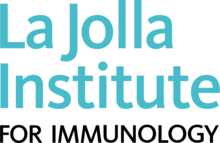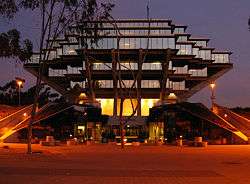La Jolla Institute for Immunology
La Jolla Institute for Immunology is a non-profit research organization located in La Jolla, California. It is located in UC San Diego’s Research Park. The Institute researches immunology and immune system diseases. The Institute employees 23 faculty members and more than 300 employees. Dr. Mitchell Kronenberg has served as its President and Scientific Director since 2003. The Institute was founded in 1988.[1]
 | |
| Motto | Life Without Disease |
|---|---|
| Founder(s) | Makoto Nonaka |
| Established | 1988 |
| Focus | Immunology Research |
| President | Mitchell Kronenberg, Ph.D. |
| Faculty | 23 |
| Adjunct faculty | 9 |
| Owner | Non-profit, independent research institute |
| Location | , |
| Coordinates | 32.87721°N 117.21993°W |
| Address | 9420 Athena Circle |
| Website | lji |
La Jolla Institute for Immunology is a collaborative research organization that has forged many partnerships within the research community in San Diego, across the United States, and abroad. The institute's biomedical research facility covers 145,000 square feet inclusive of specialized research rooms suited for all aspects of molecular and cellular biology.
History
La Jolla Institute for Immunology was established in 1988[2] by a coalition that included Dr. Makoto Nonaka, the Institute's founding president, and Dr. Kimishige Ishizaka, the Institute's first scientific director.[3]
In 1989 the Institute began its laboratory operations with the arrival of two immunologists, Dr. Kimishige Ishizaka and Dr. Teruko Ishizaka, from Johns Hopkins University in Baltimore, Maryland. The Ishizakas were co-discoverers in 1966 of the IgE (immunoglobulin E) protein, a molecule that induces allergic reactions in the human body.[3] In 1991 Dr. Kimishige Ishizaka was appointed President/Scientific Director of the Institute and served in this role until his retirement in 1995.[3][4][5]
In 1995 Dr. Howard Grey joined La Jolla Institute of Immunology as president and scientific director. During the next several years, the Institute recruited prominent faculty members and formulated a program to accelerate the commercial development of LJI's research and drug discoveries. In 1996 the Institute moved from its initial location on Torrey Pines Road in La Jolla to a new purpose-built facility on Science Center Drive on the Torrey Pines Mesa.[3]
In 2003 Dr. Mitchell Kronenberg was appointed President and Scientific Director. That same year, the Immune Epitope Database (IEDB) was established and launched.[6] The database was designed and developed by the La Jolla Institute under a competitive contract from the National Institute of Allergy and Infectious Diseases (NIAID), part of the NIH. In 2012, the NIH renewed their contract with the Institute for a further seven years.[3]
In 2006 the Institute opened a new research facility located in the new UC San Diego Science Research Park. In 2011, the Institute opened the RNAi Center for Identifying Genetic Triggers of Disease. The center's goal is to propel scientific efforts to pinpoint the specific genes involved in causing immune diseases, cancer, and other diseases using RNA interference (RNAi) technology.[3] That same year, the La Jolla Institute and Immunology became the fifth collaborating organization to join the Sanford Consortium for Regenerative Medicine.[7]
In 2013 La Jolla Institute extended its partnership with the Japanese pharmaceutical company Kyowa Hakko Kirin. The six-year agreement continues a research alliance that began in 1988.[8] In 2015 the La Jolla Institute for Immunology announced its affiliation with the UC San Diego Health System.[9]
In 2018, the La Jolla Institute for Allergy and Immunology changed its name to La Jolla Institute for Immunology to reflect its current focus.[10]
References
- "About Us". La Jolla Institute for Immunology. Retrieved 2 March 2019.
- "La Jolla institute is unlocking the mysteries of the immune system". Lajollalight.com. Retrieved 6 March 2019.
- "About Us: History". La Jolla Institute for Immunology. Retrieved 6 March 2019.

- "Archived copy". Archived from the original on 2019-02-27. Retrieved 2019-03-06.CS1 maint: archived copy as title (link)
- Roberts, Sam (26 July 2018). "Dr. Kimishige Ishizaka, Who Found Allergy Link, Dies at 92". Retrieved 6 March 2019 – via NYTimes.com.
- Salimi, Nima; Fleri, Ward; Peters, Bjoern; Sette, Alessandro (1 October 2012). "The immune epitope database: a historical retrospective of the first decade". Immunology. 137 (2): 117–123. doi:10.1111/j.1365-2567.2012.03611.x. PMC 3461392. PMID 22681406.
- "About". Sanford Consortium for Regenerative Medicine. Retrieved 6 March 2019.
- "Xconomy: La Jolla Institute Extends 25-Year Partnership with Japanese Pharma". Xconomy.com. 31 July 2013. Retrieved 6 March 2019.
- Fikes, Bradley J. "UCSD scientists praise La Jolla Institute alliance". Sandiegouniontribune.com. Retrieved 6 March 2019.
- Jennewein, Chris (25 February 2019). "Top Ebola Researcher Leaving Scripps for La Jolla Institute for Immunology". Timesofsandiego.com. Retrieved 6 March 2019.
